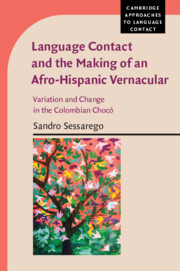
-
Select format
-
- Publisher:
- Cambridge University Press
- Publication date:
- August 2019
- September 2019
- ISBN:
- 9781108661782
- 9781108485814
- 9781108724777
- Dimensions:
- (228 x 152 mm)
- Weight & Pages:
- 0.46kg, 246 Pages
- Dimensions:
- (229 x 152 mm)
- Weight & Pages:
- 0.37kg, 250 Pages
You may already have access via personal or institutional login
Book description
Exploring creole studies from a linguistic, historical, and socio-cultural perspective, this study advances our knowledge of the subject by using a cohesive approach to provide new theoretical insights into language shift, language acquisition and language change. It compares the legal system regulating black slavery in Chocó, Colombia with the systems implemented by other European colonial powers in the Americas, to address questions such as what do Chocó Spanish linguistic features say about the nature of Afro-Hispanic vernaculars? What were the sociohistorical conditions in which Chocó Spanish formed? Was slavery in Chocó much different from slavery in other European colonies? Whilst primarily focused on Afro-Hispanic language varieties, Sessarego's findings and methodology can be easily applied and tested to other contact languages and settings, and used to address current debates on the origin of other black communities in the Americas and the languages they speak.
Reviews
‘The final considerations emphasize, among other ideas, the importance of articulation in the humanities, and therein lies its greatest strength: this text not only contributes to creolistics and the study of language acquisition, but also allows other disciplines to demonstrate the interpretation of colonial documentary sources and the power of comparative law to understand the history of communication forms among Afro-descendant populations. Furthermore, it highlights the resilience and expressive richness of Black communities while offering an example of the use of the colonial archive and historical discourse.’
Gloria J. Morales Osorio Source: Revista de Estudios Colombianos
Contents
Metrics
Altmetric attention score
Full text views
Full text views help Loading metrics...
Loading metrics...
* Views captured on Cambridge Core between #date#. This data will be updated every 24 hours.
Usage data cannot currently be displayed.
Accessibility standard: Unknown
Why this information is here
This section outlines the accessibility features of this content - including support for screen readers, full keyboard navigation and high-contrast display options. This may not be relevant for you.
Accessibility Information
Accessibility compliance for the PDF of this book is currently unknown and may be updated in the future.


